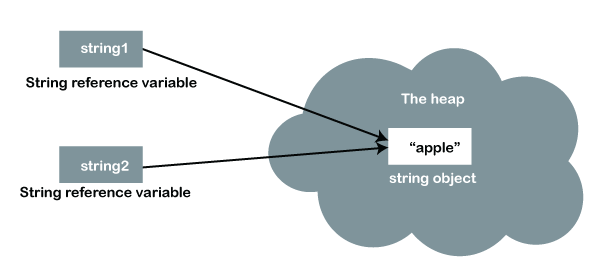Why Are Strings Immutable in Java? In-depth Evaluation for Programmers
Unalterable Strings: A Key Part in Ensuring Data Uniformity and Reliability
In the world of data administration, the value of unalterable strings can not be overemphasized. These unchanging sequences of personalities play a crucial role in supporting the integrity and precision of information within systems. By maintaining a state of immutability, information consistency is ensured, promoting a structure of dependability whereupon crucial procedures rely. The concept of unalterable strings transcends simple triviality; it is a linchpin in the complex internet of data governance. As we check out the benefits, application methods, and functional applications of immutable strings, a clearer photo arises of their essential nature in protecting the electronic landscape.
The Principle of Immutable Strings
Unalterable strings, a fundamental idea in shows, describe strings that can not be modified once they are developed. Essentially, when a string value is assigned, any type of operation that shows up to change the string actually creates a new string. This immutability makes sure information consistency and dependability in applications, as it avoids unexpected adjustments to the initial information.
Advantages in Information Uniformity

Information consistency is vital in numerous aspects of software program advancement, including data source administration, multi-threaded atmospheres, and dispersed systems (Why are strings immutable in Java?). Unalterable strings contribute significantly to achieving this consistency by avoiding data corruption because of simultaneous accessibility. In situations where several procedures or strings engage with the very same information all at once, immutable strings work as a safeguard versus race conditions and synchronization issues
In addition, the immutability of strings streamlines debugging and testing processes. With unalterable strings, developers can rely on that when a string is established, it will stay the same, making it easier to trace the resource of mistakes and ensuring that test instances produce consistent outcomes. This reliability in information handling eventually results in a lot more secure and durable applications.

Implementing Unalterable Strings
Making sure the immutability of strings calls for a thoughtful approach to their execution in software development. As soon as a string item is produced, one essential technique is to design string courses in a way that protects against adjustments. By making strings immutable, designers can boost information uniformity and reliability in their applications.
To carry out immutable strings properly, designers should favor creating brand-new string items as opposed to changing existing ones. This practice makes sure that once a string is appointed a worth, it can not be altered. In addition, any type of procedure that shows up to customize the string needs to create a brand-new string with the preferred content changes rather than changing the original.
Moreover, utilizing immutable strings can simplify concurrency monitoring in multi-threaded environments. Given that immutable strings can not be changed after production, they can be securely shared among numerous strings without the threat of data corruption.
Function in Dependability Guarantee
In software advancement, the usage of immutable strings plays an essential function in ensuring the integrity of data operations. Immutable strings, as soon link as produced, can not be changed, ensuring that the data they stand for remains consistent throughout the application's execution. This immutability building supplies a degree of guarantee that the information being processed will not be unintentionally changed, resulting in unexpected outcomes or errors in the system.
By incorporating unalterable strings into software program layout, programmers can boost the integrity of their applications by minimizing the dangers related to mutable information - Why are strings immutable in Java?. Unalterable strings assist in stopping information corruption or unintended adjustments, which can be specifically crucial when handling sensitive details or when information stability is paramount
Moreover, using unalterable strings simplifies simultaneous handling, as multiple threads can safely access and share string information without the danger of one string changing the web content while an additional is reviewing it. This facet adds substantially to the overall reliability of the software system, making sure foreseeable and regular actions in information managing operations.
Applications and System Assimilation
The seamless assimilation of immutable strings right into different applications and systems is critical for making sure durable data uniformity and reliability throughout varied technical settings - Why are strings immutable in Java?. Unalterable strings play a vital function in enhancing the honesty of data helpful resources exchanges and communications within facility software application environments. By integrating unalterable strings right into applications, developers can mitigate the risks related to data tampering, unapproved modifications, and unintended alterations, thus fortifying the overall safety and security stance of the system
In the context of system combination, immutable strings act as a foundational aspect for establishing secure communication channels and helping with smooth data transfers between different elements. Their immutable nature makes certain that data transferred in between systems remains verifiable and unchanged, minimizing the chance of incongruities or mistakes that could endanger the integrity of the entire system. In addition, immutable strings can boost interoperability between inconsonant systems by providing a standardized layout for data representation, allowing a lot more efficient data processing and exchange procedures across interconnected platforms. By adopting immutable strings in applications and system integration processes, companies can fortify their data facilities and support the reliability and uniformity of their details assets.
Conclusion
To conclude, immutable strings play an important role in preserving information consistency and dependability in different applications and system integrations. By making certain that strings can not be altered when developed, the stability of information is preserved, reducing the threat of incongruities and mistakes. Implementing unalterable strings can dramatically enhance the dependability of systems, ultimately causing more precise and reputable information processing.
